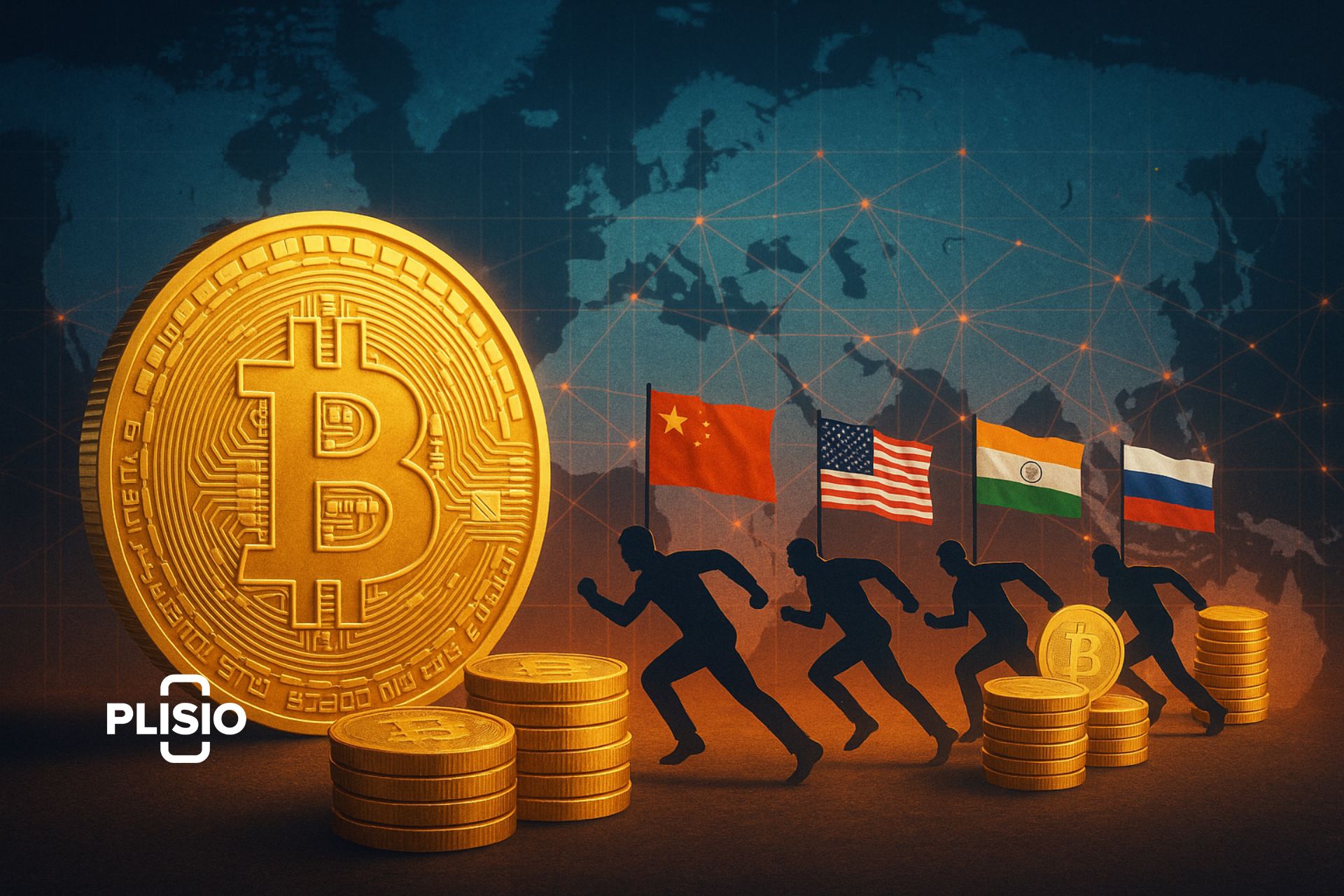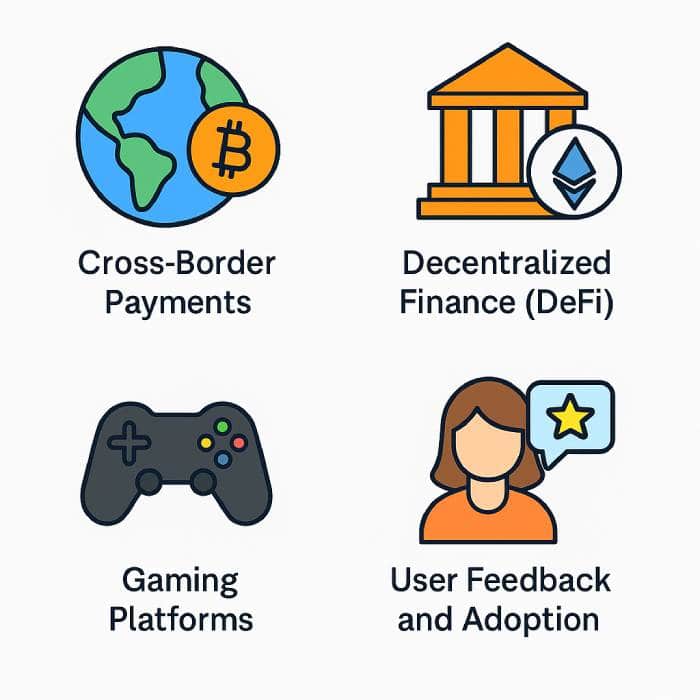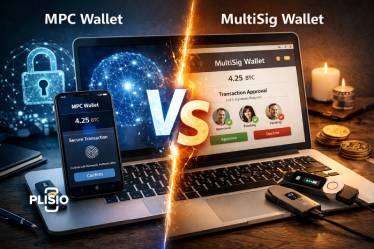Global Crypto Race

As the world braces for a digital future, countries are taking dramatically different stances on Bitcoin. Some are rushing to accumulate it, while others — like Japan and Switzerland — remain indifferent. With Bitcoin’s fixed supply capped at 21 million, scarcity has become a key driver of national interest. Countries like El Salvador and Bhutan already hold significant amounts, while other cryptocurrencies like Solana (SOL) and Ethereum (ETH) are also gaining government attention.
Plisio experts emphasize that Bitcoin’s scarcity and decentralization make it a unique geopolitical asset, unlike any fiat reserve currency.
U.S. Leads with Strategic Bitcoin Accumulation
The U.S. government currently holds over 195,000 BTC — worth more than $16 billion. A proposed bill in the House, called the Strategic Bitcoin Reserve Bill, aims to increase this to 1 million BTC within five years. At current prices, that would cost around $110 billion. If passed, the U.S. could surpass even Satoshi Nakamoto, Bitcoin’s pseudonymous creator, who is believed to own around 1.1 million BTC.
Michael Saylor, a prominent advocate, compares Bitcoin to "digital gold" and calls its acquisition a source of economic strength. He even likens the strategy to a modern-day Manhattan Project, branding BTC as "digital energy." Anthony Pompliano believes a new financial arms race is unfolding, with the U.S. and Russia both eyeing BTC as a strategic reserve.
Plisio analysts confirm that strategic Bitcoin accumulation by national entities introduces a new dynamic to traditional reserve economics, especially in a time of rising inflation and dollar skepticism.
Critics argue that too much government control could undermine the decentralized ethos of crypto. Supporters, however, see early accumulation as a smart move, given Bitcoin’s increasing scarcity. Some crypto holders are even leveraging their portfolios for entertainment and profit — such as using platforms like Stake Casino while they wait for favorable market moves.

Asia’s Mixed Feelings on Bitcoin Reserves
In Asia, governments are divided on whether to hold Bitcoin as a reserve. South Korea's central bank has acknowledged BTC’s potential, but national regulators remain cautious. Still, South Korea is home to a massive crypto market. About 50% of the country's population in their 30s are investing in digital coins, and major exchanges like Upbit and Bithumb dominate the local scene. Despite the enthusiasm, strict regulations and tax policies persist.
Meanwhile, Bhutan has been quietly mining Bitcoin since 2019, using surplus hydroelectric power. The country plans to expand its crypto mining operations in partnership with Bitdeer, a firm founded by Jihan Wu.
Japan and Switzerland, on the other hand, have taken a more conservative approach. Japan has not recognized BTC as a strategic reserve, while the Swiss National Bank dismissed it as a “niche trend,” citing volatility and liquidity challenges.
Outside Asia, El Salvador continues to lead, holding over 6,089 BTC as of February 2025. The country adds roughly 1 BTC per day to its reserves. Despite criticism from global financial bodies like the IMF, crypto advocates have applauded El Salvador’s bold move to make Bitcoin legal tender in 2021.
Christine Lagarde, President of the European Central Bank, remains skeptical, stating Bitcoin is neither safe nor reliable. This reflects a broader global divide — while some nations embrace crypto’s potential, others prefer a wait-and-see approach.
Plisio market researchers note that Asia’s regulatory stance often reflects deeper socio-political dynamics, where national security and capital control remain top priorities.
Ethereum and Solana Join the Reserve Race
The U.S. is also eyeing other major cryptocurrencies. Both ETH and SOL are being considered as strategic digital assets. A proposal from former President Trump’s team even suggests including them in a national digital reserve.
Ethereum’s strength lies in its smart contracts, which allow decentralized apps to run autonomously. Solana, known for its speed, can process over 65,000 transactions per second, making it attractive for fast payments and scalable solutions.
Since late 2023, Solana’s price has soared by 1,500% — outpacing Bitcoin’s 300% and Ethereum’s 160% gains. This explosive growth has inspired the creation of new financial products like Solana futures contracts on CME Group. Even BlackRock is reportedly exploring a Solana ETF.
Analyst Jim Iuorio argues that the speed and utility of ETH and SOL could justify their place in national reserves. Singapore’s central bank is also researching Ethereum’s role in the digital economy.
Plisio DeFi strategist Carla Lee explains, “Ethereum and Solana both offer infrastructure for a tokenized economy. Governments that understand this potential will position themselves ahead of the curve.”
If more governments adopt these coins as strategic assets, cryptocurrencies could transition from speculative tools to integral parts of global finance. Meanwhile, businesses and states are implementing KYC procedures and compliance measures to ensure crypto’s legal and secure use.
Real-World Adoption: User Experience and Practical Use Cases
Beyond state strategies, crypto adoption continues to grow at the grassroots level:
- Cross-Border Payments: Freelancers and small businesses in Latin America and Southeast Asia use BTC and USDT for faster, lower-cost international payments. Platforms like Bitwage and Binance Pay simplify the process.
- DeFi and Savings: In countries facing inflation, such as Argentina and Turkey, users turn to Ethereum-based DeFi platforms like Aave or Compound to earn interest in stablecoins.
- Gaming & Entertainment: Users on Stake Casino and other Web3 platforms earn, wager, and cash out in SOL or BTC. NFT-based games like Star Atlas (built on Solana) attract thousands of players daily.
- User Feedback: According to a recent Chainalysis survey (2025), over 68% of crypto users in emerging markets say digital assets improve their financial independence. Many cite faster access to capital, fewer banking restrictions, and better investment options.
Plisio platform users also report improved payment flow, greater autonomy, and stronger global reach when accepting crypto for ecommerce and service-based transactions.
These use cases reflect a broader shift — crypto is not just about reserves and regulation; it's increasingly about real people finding new tools to live, earn, and invest.
Disclaimer: This article is for informational purposes only and does not constitute financial or investment advice.




